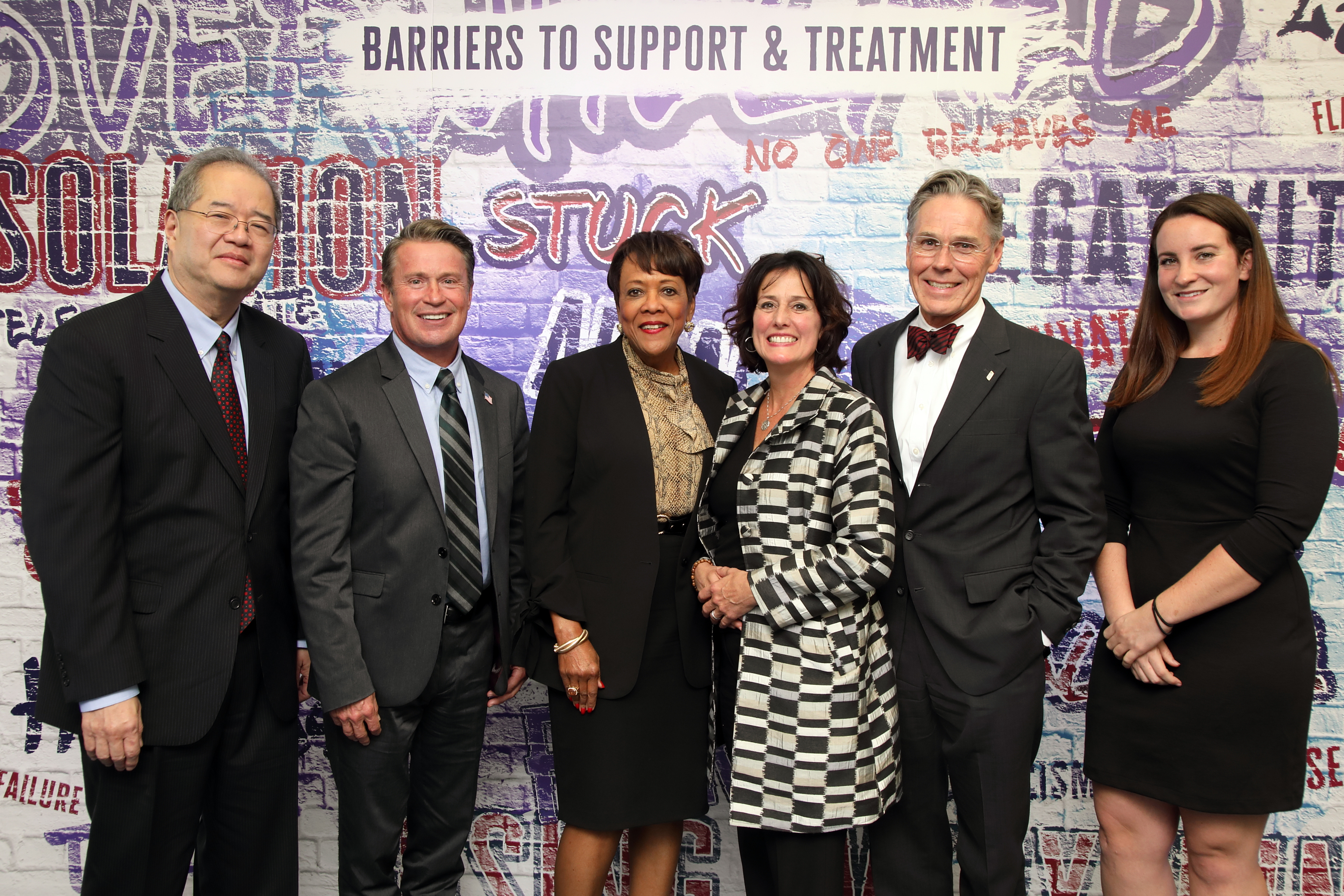
Crisis Center is the first co-located, co-funded, public-private partnership to offer behavioral health services in Maryland
Harford Crisis Center, the first of its kind in Maryland providing 24-hour behavioral, mental and addiction health services, provided a preview October 25 for more than 140 community, health and business leaders. It is the first co-located, co-funded, public-private partnership to offer behavioral health services in Maryland.
Harford Crisis Center is under construction and is expected to be fully open in spring 2019.
Using architectural renderings, guests were offered a 3D preview of the beautifully appointed center. In addition, a symbolic “wall” covered with words provided by those in recovery that explain barriers to treatment (“fear,” “access to help,” “stigma,” etc.) were on display, illustrating the problem the crisis center is working to solve.
Located at 802 Baltimore Pike in Bel Air, Harford Crisis Center will offer a 24/7 alternative to emergency department treatment for individuals experiencing a behavioral health crisis. Its broad array of services, available in one non-hospital location, is expected to significantly reduce the number of emergency department visits and inpatient admissions for Harford County residents in need of behavioral health services. Harford Crisis Center will serve individuals with mental health and/or substance use needs in a more comfortable, efficient setting, appropriate to their needs.
“There has been a need for a crisis center in Harford County for several years,” said Lyle E. Sheldon, FACHE, president and CEO of University of Maryland Upper Chesapeake Health. “We are fortunate to have committed community leaders who are able to identify challenges and who are willing to work together to overcome them. That spirit of cooperation is illustrated by the Harford Crisis Center. So many organizations have come together to make sure our friends and neighbors have access to 24/7 resources for behavioral, mental and addiction health services, so needed in our community today.”

The first phase of the project is up and running–a 24/7 hotline (800-NEXT-STEP; 800-639-8783), and the crisis center location is the home base of the county’s Mobile Crisis Team. Phase two includes the establishment of an outpatient mental health service offering therapy and medication management. Phase three includes 24/7 walk-in/urgent outpatient mental health care and a 24/7 residential crisis center, opening with eight beds. Harford Crisis Center is expected to be fully operational in spring 2019.
Ashley Addiction Treatment will be the first tenant to share the center’s space by moving its current outpatient offerings from the University of Maryland Upper Chesapeake Medical Center campus to the Harford Crisis Center location later this fall. They will continue to offer addiction services in this new convenient location.
When fully up and running, it is estimated that between 2,000 and 3,000 patients will receive some type of treatment services annually at the Harford Crisis Center.
The crisis center is managed by University of Maryland Upper Chesapeake Health in partnership with Harford County Government, Healthy Harford/Healthy Cecil, Harford County Health Department and Office on Mental Health/Core Service Agency of Harford County, Inc., and the Affiliated Santé Group.
“I want to thank our partners for their efforts to make the 24/7 hotline, around-the-clock mobile crisis services, and the future crisis center a reality,” County Executive Barry Glassman said. “The services offered here will be a lifeline for Harford County families and will help them along a path to recovery and healing. Our goal is an environment where every crisis is met with dignity, compassion and quality care.”
The October 25 preview was moderated by Sharon Lipford, executive director of Healthy Harford/Healthy Cecil, and included remarks from Lyle Sheldon, FACHE, president and CEO of University of Maryland Upper Chesapeake Health; Harford County Executive Barry Glassman; Dr. Russell W. Moy, Harford County health officer; Dr. Barbara Bazron, deputy secretary, Behavioral Health Administration, Maryland Department of Health, and Myra Derbyshire, a peer recovery coach.
Those attending the preview were invited to meet the leadership and members of the crisis hotline team, Mobile Crisis Team, those in recovery, peer specialists and representatives from Ashley Addiction Treatment.
“The Harford Crisis Center is a perfect example of the public and private sectors working together to create a more integrated experience, in a single location, for those in need,” said Rod Kornrumpf, FACHE, regional executive director-behavioral health, University of Maryland Upper Chesapeake Health. “The crisis hotline is really that easy-to-reach, less-confusing conduit that can open the door to access the rest of the services in that building and throughout Harford County. The goal has been and will be to make access to needed services much easier and appropriate.”
Harford County Health Officer Dr. Russell W. Moy said, “Launching the Harford Crisis Center addresses the county’s top public health priorities–substance use disorders and mental health. The need for a 24/7 integrated behavioral health crisis center in Harford County was very clear, and community partners came together in an extraordinary way to make the center a reality. We are proud to be part of this critical effort to help those in need of treatment and recovery services.”
Earlier this month, Harford County’s first 24/7 behavioral health, mental health and addiction services crisis hotline, 800-NEXT-STEP (800-639-8783), was announced.
When someone in crisis calls the new hotline, he/she will reach a behavioral health expert who has rapid access to the Mobile Crisis Team in addition to the most up-to-date information about behavioral health and addiction services providers across the region. Peer specialists who are in recovery themselves will also be available to callers. Follow-up with callers will be coordinated by care navigators.
“Access to immediate treatment and coordination of care are two of the most important services that will take place at the Harford Crisis Center,” said Jessica Kraus, executive director of the Office on Mental Health/Core Service Agency of Harford County, Inc. “The 24/7 hotline and Mobile Crisis Team will work hand in hand with other services including therapy and medication management as well as walk-in/urgent outpatient mental health care and a residential crisis center. Wellness and recovery are our ultimate goals.”
In addition, the hotline is being linked to 2-1-1 Maryland, a 24/7 statewide health and human service referral provider, in order to share resources and provide a seamless, regional approach to people in crisis.
Behavioral health encompasses common issues such as anxiety and depression, alcohol and substance-related disorders as well as the lesser occurring issues such as schizophrenia and other psychotic disorders.
About University of Maryland Upper Chesapeake Health
In December 2013 Upper Chesapeake Health became University of Maryland Upper Chesapeake Health. It consists of the University of Maryland Upper Chesapeake Medical Center and the Patricia D. and M. Scot Kaufman Cancer Center in Bel Air, the Senator Bob Hooper House in Forest Hill and the University of Maryland Harford Memorial Hospital in Havre de Grace. The leading health care system and largest private employer in Harford County, UM Upper Chesapeake Health offers a broad range of health care services, technology and facilities to the residents of northeastern Maryland. Visit www.umuch.org for more information.



